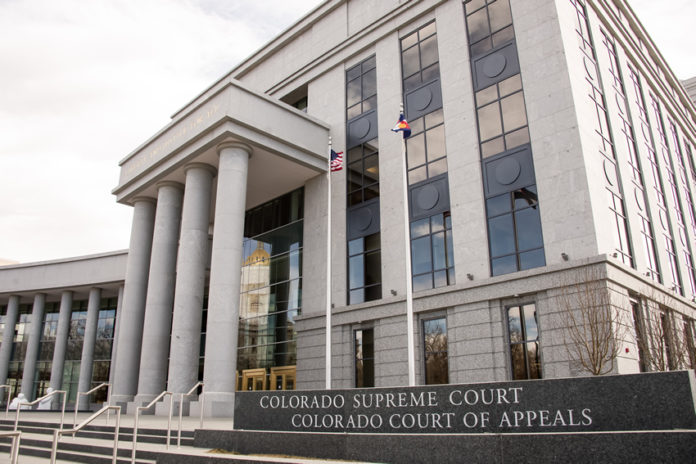
The Colorado Supreme Court will hear its first oral arguments of 2021 this week, including two cases that come directly from the district courts. One of the cases that was fast-tracked to the high court involves a high-speed bill reading in the Colorado Senate that caused controversy during the 2019 legislative session, while the other centers around a record sealing dispute in the class-action case over infections at Porter Adventist Hospital.
SENATE SPEED READING
On Tuesday, the Colorado Supreme Court will hear arguments in a case arising from the state Senate’s reading of a bill during the 2019 legislative session.
The bill in question was House Bill 19-1172, a 2,000-page bill to recodify existing statutes on the regulation of professions and occupations. In an effort to stall other legislation, Senate Republicans asked that HB 19-1172 be read at length.
A Senate clerk read the bill aloud for more than three hours, but Secretary of the Senate Cindi Markwell eventually decided the reading was a task for machine, rather than man, and directed staff to set up several computers on the Senate floor to simultaneously read different sections of the bill at up to 650 words per minute.
Senate Republicans, including Sen. John Cooke of Weld County and Senate Minority Leader Chris Holbert of Parker, filed suit against Markwell and President of the Senate Leroy Garcia, Jr. of Pueblo, alleging the computers’ reading of the bill didn’t meet the requirements of the Colorado Constitution. The district court sided with the Republicans and issued a preliminary injunction and declared bills must be read “in an intelligible manner and at an understandable speed.”
The parties jointly asked the Colorado Supreme Court to review the district court’s decision, citing the likelihood of future litigation over bill reading methods as one of the reasons the high court should take the case.
The Supreme Court will consider whether the lower court should have deemed the dispute a political question and refused to weigh in on the case at all. The high court will also consider whether the district court correctly evaluated the requirements for injunctive relief and whether the court’s declaratory relief was appropriate, given that the standards for “intelligible” and “understandable” bill readings are not defined.
Markwell and Garcia argue the lower court erred by deciding a non-justiciable political question. They also say the lower court erred in its analysis of criteria for injunctive relief and granted injunctive relief that is “excessive” in its reach. Additionally, they argue, the court’s declaratory relief doesn’t provide any clarity to the parties.
Cooke and his fellow Republicans argue Colorado case law doesn’t support Markwell’s political question challenge, which they call “unprecedented” and an attempt to “inoculate themselves from constitutional scrutiny.” Cook also argues the district court correctly interpreted the Colorado Constitution’s Reading Clause as requiring something more than “using multiple computers … to read different portions of the bill at one time, at a speed the mind cannot comprehend.”
Gov. Jared Polis filed an amicus brief in the case that does not express support for either side but alerts the court that its decision could “significantly” affect the outcome of another case, Rocky Mountain Gun Owners v. Polis, which is pending before the Court of Appeals. That lawsuit, which challenges the state’s large capacity magazine ban, also deals with the political question doctrine, according to the Polis brief.
Porter Hospital’s DISCOVERY Detour
On Wednesday, the Supreme Court will hear arguments in a dispute over sealed records in a class-action lawsuit against Porter Adventist Hospital involving nearly 270 plaintiffs who allege the hospital failed to properly sterilize equipment, leading to serious, and even fatal, infections.
The medical malpractice suit, which is still pending in Denver district court, has taken a detour to the Supreme Court over the hospital’s request to suppress government agency reports. In May 2020, the hospital filed a motion for a protective order seeking a ruling that plaintiffs could not use and should destroy “privileged” documents they received as a result of open records requests to the Colorado Department of Public Health and Environment, including a 2018 government report on the hospital’s sterilization procedures.
Denver District Court Judge Morris Hoffman denied the motion and found many of the documents the hospital sought to suppress, including government reports from the CDPHE and Centers for Medicare and Medicaid Services, were not privileged because they were already in the public domain and were not produced by the hospital during discovery. Hoffman also ruled the hospital had waited too long to ask the courts to act to suppress certain documents.
The hospital then petitioned the Supreme Court to review the trial court’s order denying the protective order. Porter Adventist argues the lower court abused its discretion in determining the hospital failed to establish privilege.
The hospital claims it did establish privilege and that the trial court, among other errors, failed to conduct an in-camera review that would have cleared up uncertainty over whether privilege applied.
Porter Adventist also argues the trial court’s ruling undermines public policy by discouraging cooperation between hospitals and the CDPHE. Instead, Porter Adventist claims, hospitals might be incentivized to withhold information from public health authorities out of fear it may be disclosed and used against them.
In their briefs to the high court, the plaintiffs call the hospital’s actions an “unprecedented attempt to suppress public health information” and they note that many of the details contained in the government reports have already been reported by media. The plaintiffs argue civil rules don’t allow restrictions on documents produced outside of discovery. They also say prohibiting dissemination of information lawfully obtained through open records requests would violate the First Amendment.
In addition, the plaintiffs argue a protective order would have “stopped these cases in their tracks,” spawning “line-by-line fights” over the lawsuit allegations and leading to witness taint hearings.
—Jessica Folker

